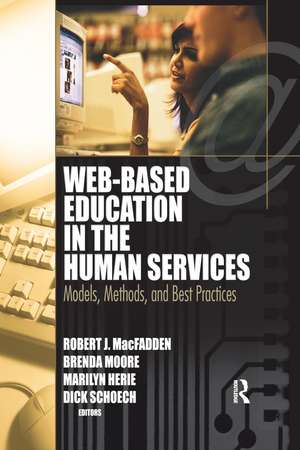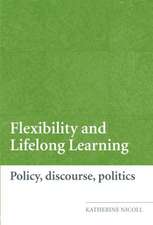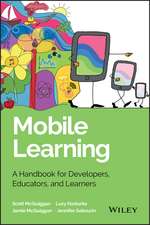Web-Based Education in the Human Services: Models, Methods, and Best Practices
Autor Richard Schoech, Brenda Moore, Robert James Macfadden, Marilyn Herieen Limba Engleză Hardback – 11 oct 2005
Web-Based Education in the Human Services reflects the vitality and diversity of Web-based courses currently delivered within human services. Unlike previous texts that have combined technologies such as Interactive Television (ITV) and two-way audio where Web involvement was minimal, this unique book focuses on Web-based models, tools, and techniques used in courses where the majority of the content is delivered online. The book’s contributors emphasize the social aspects of learning, examining topical areas not usually associated with Web-based education as they remind us of the need to move beyond the similarities between WBE and face-to-face (FTF) approaches.
Web-Based Education in the Human Services documents a course delivery method coming of age in its desire to create virtual learning environments that incorporate a variety of techniques and strategies. These environments use concepts and tools beyond what packages such as WebCT currently offer, highlighting the power of designing a complete Web-based curriculum, rather than viewing each course separately. Many of the most successful approaches presented in this invaluable book don’t involve sophisticated tools or programming, but the creative design of interactive scenarios, emotional content, and feedback mechanisms that reinforce the instructor’s role as the crucial ingredient for success.
Web-Based Education in the Human Services examines:
- adult learning theories
- teaching practice skills through Web-based technology
- how to bridge the gap between theory and practice
- faculty perceptions of the effectiveness of Web-based instruction compared to face-to-face instruction
- the accessibility of Web-based education
- the significance of emotion in learning
- Web-based delivery of a graduate professional training program
- the creation, delivery, and evaluation of a pilot course using Blackboard 6™
- the development of a Web-based undergraduate child welfare course
- the use of Web-based video clips for counselor skills training
- the design, development, pilot, and revision of a Web-based social work practice course
- an online format for agency-based field instruction
- the design of a Web-based graduate program in counseling psychology
- and much more!
| Toate formatele și edițiile | Preț | Express |
|---|---|---|
| Paperback (1) | 255.51 lei 6-8 săpt. | |
| Taylor & Francis – 28 sep 2005 | 255.51 lei 6-8 săpt. | |
| Hardback (1) | 629.52 lei 6-8 săpt. | |
| Taylor & Francis – 11 oct 2005 | 629.52 lei 6-8 săpt. |
Preț: 629.52 lei
Preț vechi: 945.27 lei
-33% Nou
Puncte Express: 944
Preț estimativ în valută:
120.49€ • 124.17$ • 101.72£
120.49€ • 124.17$ • 101.72£
Carte tipărită la comandă
Livrare economică 04-18 martie
Preluare comenzi: 021 569.72.76
Specificații
ISBN-13: 9780789026293
ISBN-10: 0789026295
Pagini: 354
Dimensiuni: 152 x 229 mm
Greutate: 0.7 kg
Ediția:New.
Editura: Taylor & Francis
Colecția Routledge
Locul publicării:Oxford, United Kingdom
ISBN-10: 0789026295
Pagini: 354
Dimensiuni: 152 x 229 mm
Greutate: 0.7 kg
Ediția:New.
Editura: Taylor & Francis
Colecția Routledge
Locul publicării:Oxford, United Kingdom
Cuprins
- Web-Based Education in the Human Services: Content and Connections (Robert MacFadden,
Brenda Moore, Marilyn Herie, and Dick Schoech) - Key Issues in Web-Based Education in the Human Services: A Review of the Literature (Brenda Moore)
- Theoretical Perspectives in Online Pedagogy (Marilyn Herie)
- Faculty Perceptions of the Effectiveness of Web-Based Instruction in Social
Work Education: A National Study (Brenda Moore) - Web-Based Higher Education: The Inclusion/Exclusion Paradox (Jan Steyaert)
- Souls on Ice: Incorporating Emotion in Web-Based Education (Robert J. MacFadden)
- The Campus Alberta Applied Psychology Counselling Initiative: Web-Based Delivery of a Graduate Professional Training Program (Sandra Collins and Paul Jerry)
- A Tale of Three Cities: Teaching Online to Students in Shanghai from Hong Kong and Texas (Yu Cheung Wong and Dick Schoech)
- Internationalizing Social Work Education Using Blackboard 6: INHOLLAND University, NL and James Madison University, USA (Karen A. Ford and Rina J. Rotgans-Visser)
- A Child Welfare Course for Aboriginal and Non-Aboriginal Students: Pedagogical and Technical Challenges (Jacquie Rice-Green and Gary C. Dumbrill)
- Web-Based Education in the Human Services: Use of Web-Based Video Clips in Counselling Skills Training (Dr. Paul Jerry and Dr. Sandra Collins)
- Building a Predominantly Web-Based Course From Face-to-Face and Interactive Video Pilots: Administrative Skills for Social Work Practice (Paul P. Freddolino and David G. Knaggs)
- Field Clusters On Line (Suzanne Bushfield)
- Student Perspectives of Online Discussions: Strengths and Weaknesses (Timothy Barnett-Queen, Robert Blair, and Melissa Merrick)
- Social Work Ethics Online: Reflective Learning (Marilyn A. Biggerstaff)
- Translating Research into Practice: The Role of Web-Based Education (Kenneth R. Weingardt and Steven W. Villafranca)
- Working Across the Disciplines/Shifting Perspectives: Student Experiences with an Online Course Focused on Interdisciplinary Practice with Children and Families (Patricia A. MacKenzie and Dora Leigh Bjornson)
- Evaluating the Efficacy of Traditional and Web-Assisted Instruction in an Undergraduate Social Work Practice Class (Helen Petracchi, Gayle Mallinger, Rafael Engel, Carrie W. Rishel, and Carol Washburn)
- COMPENDIUM
- Index
- Reference Notes Included
Notă biografică
Schoech, Richard; Moore, Brenda; Macfadden, Robert James; Herie, Marilyn
Descriere
Web-Based Education in the Human Services reflects the vitality and diversity of Web-based courses currently delivered within human services. Unlike previous texts that have combined technologies such as Interactive Television (ITV) and two-way audio where Web involvement was minimal, this unique book focuses on Web-based models, tools, and techniques used in courses where the majority of the content is delivered online. The book's contributors emphasize the social aspects of learning, examining topical areas not usually associated with Web-based education as they remind us of the need to move beyond the similarities between WBE and face-to-face (FTF) approaches.












